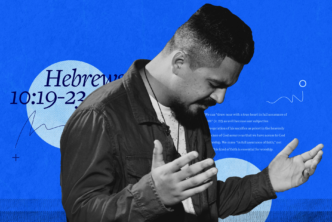The last week of Jesus’ life is also known as Holy Week. On the first day of the week prior to Jesus’ crucifixion, he and his disciples entered Jerusalem and spent the night in Bethany (Mark 11:11). Jesus knew that he would be arrested, tried, and crucified later that week.
How does he use this last stretch of time?
- He curses the fig tree (Mk 11:12-14, 20-25; Mt 21:18-22)
- He cleanses the temple (Mk 11:15-17; Mt 21:12-13; Lk 19:45-46)
- He teaches in the temple (Mk 11:27-12:12; Mt 21:23-22:14; Lk 20:1-19)
- He predicts the destruction of the temple and last things (Mk 13:1-37; Mt 24:1-25:46; Lk 21:5-36)
- He is anointed in Bethany (Mk 14:3-9; Mt 26:6-13; cf. Jn 12:1-8 and Lk 7:37-39)
Have you ever noticed how many of Jesus’ parables are taught during this week? How about the growing frequency of interactions he has with authorities in Jerusalem?
Jesus in the temple
Jesus cleanses the temple and heals people who need help. For this, the authorities hated him even more.
After this, Jesus engages in a “stump-the-teacher” session with all sorts of folks, answering questions about paying taxes, resurrection, and the greatest commandment. And those are just the questions we know about. I don’t know about you, but I get the sense that many of these questions were tests to see how good Jesus was. Sort of how we all (whether we admit to it or not) have “test passages” we like to use when examining commentaries or study Bibles. Jesus passed this questioning with flying colors, of course, because he is Jesus. If someone had questions about Jesus and what he taught, that person’s larger concerns may have been answered by this session.
So Jesus and his disciples leave the temple area. After his disciples respond in awe to the size and beauty of the temple complex (Mk 13:1), Jesus says that it will all be destroyed (Mk 13:2). He was beginning to focus them on the gospel that really matters instead of the magnificent architecture and beauty of human effort.
The Mount of Olives
From here he goes on to the Mount of Olives (Mk 13:3-37; Mt 24:1-25:45, called the “Olivet Discourse” by some) and begins to talk about end times. Jesus’ prophecy can be paraphrased: “Horrible, unthinkable things will happen, and then it’ll get worse. Help those who need help. Watch and be ready for my return. It’ll happen; I will be back.”
Afterward, in Bethany, during dinner at Simon the leper’s house, a woman, nameless in Matthew and Mark (Mk 14:3-9; Mt 26:6-13), dumps a bunch of expensive perfume on Jesus’ feet. Jesus says she is helping prepare his body for burial. That’s very weird for us to read—imagine what the folks at dinner were thinking! But Jesus said it was a beautiful thing.
Yes, I think Jesus was getting ready for his crucifixion, and he was getting his disciples ready, too. Take some time today or tomorrow to look at the steps he took and the things he taught, and let Jesus get you ready to experience his death, and (praise God!) celebrate his resurrection.




